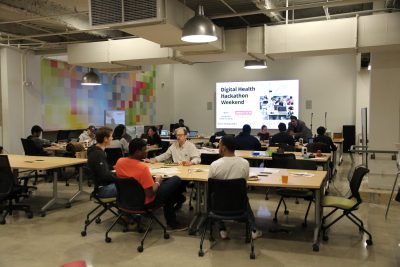OPIM Innovate is proud to announce that it will be continuing its workshop series starting this Friday, February 15th. Topics that will be covered in this semester’s workshops include artificial intelligence (A.I.), wearable technology, drones, Splunk analytics, natural language processing, and 3D printing. All workshops will be held on Fridays at the Gladstein Lab, BUSN 391 from 1:00-3:00 PM and are open to all UConn students, staff, and faculty. For more details on these workshops, including where to sign up, please keep reading!
Friday, February 15th – Introduction to A.I. Workshop: This informative workshop will be exploring the concepts of machine learning and neural networks. Discussions will also be had concerning the real-world implications of A.I. progression for the future. Interested? Sign up here.
Friday, February 22nd – Splunk Analytics Workshop: During this workshop, attendees will be briefed on the Splunk Enterprise software and how Splunk, Inc. is revolutionizing the analysis of machine data. Data security, Internet of Things, and machine learning concepts will also be discussed and further explored through Splunk. While a prior understanding of the fundamentals to the aforementioned concepts can be helpful, it is not required for participation in the workshop. Additional resources will be provided to those who want to learn more about Splunk after the workshop. Interested? Sign up here.
Friday, March 1st – Wearable Tech in Action Workshop: In this workshop, attendees will learn how microcontrollers are being used to help solve real-world business problems. Then, after being introduced to microcontrollers like FLORA and GEMMA, they will be invited to build their own wearable projects for hands-on experience. Different projects will be available to choose from. We will be providing additional resources for those who would like to learn more about microcontrollers after the workshop. Interested? Sign up here.
Friday, March 29th – Alexa Skill Building Workshop: Smart voice and natural language processing technologies are becoming the new norm due to smart speaker products like the Amazon Alexa line. In this workshop, attendees will be given an overview of these smart speakers and their application in different business sectors. Then, each participant will develop their own Alexa Skill for Alexa to learn. Interested? Sign up here.
Friday, April 19th – Drones in Action Workshop: This workshop, in collaboration with On Course Drones, a drone pilot training company, teaches students about drone technology and how drones fly. During the workshop, attendees will learn about how drones have impacted a number of industries, including the insurance, logistics, medicine, and entertainment industries. This will then lead to a demonstration of different types of drones and hands-on, drone-flying experience. Interested? Sign up here.
Friday, April 26th – 3D Modeling Workshop: The last workshop of the semester, the 3D Modeling workshop will give attendees an overview of 3D Modeling technologies and how they are used in different industries. Real world demonstrations of 3D Printing will also be shown, and additional resources will be provided for those who would like to learn more. Interested? Sign up here.
We hope that one or more of our workshops interest you, and that you come visit us, soon!
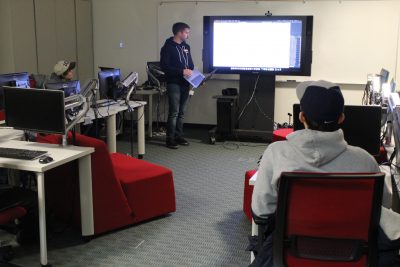 On Friday, February 22nd, OPIM Innovate hosted its Splunk Analytics Workshop. There, Professor
On Friday, February 22nd, OPIM Innovate hosted its Splunk Analytics Workshop. There, Professor 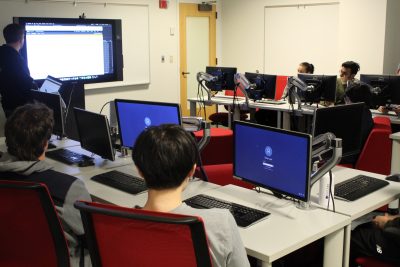 Splunk is a very flexible service that allows users to integrate data from other software such as SQL Developer, a database client. “Databases are everywhere and important,” O’Connor explained to students, “but, some database clients don’t visualize data well. They just store it, keep its structure, and that’s it.” That is why O’Connor developed an application, called DB Connect, that can grab database information, make a copy of the data inside of Splunk, and then visualize it. “It can make pie charts, line charts, or whatever the case may be,” said O’Connor. “Splunk isn’t designed to replace any one of these [database clients], but instead to aggregate data from them.” Splunk can also capture real-time web data, such as the number of times a server is pinged by a computer or the number of times it is successfully infiltrated.
Splunk is a very flexible service that allows users to integrate data from other software such as SQL Developer, a database client. “Databases are everywhere and important,” O’Connor explained to students, “but, some database clients don’t visualize data well. They just store it, keep its structure, and that’s it.” That is why O’Connor developed an application, called DB Connect, that can grab database information, make a copy of the data inside of Splunk, and then visualize it. “It can make pie charts, line charts, or whatever the case may be,” said O’Connor. “Splunk isn’t designed to replace any one of these [database clients], but instead to aggregate data from them.” Splunk can also capture real-time web data, such as the number of times a server is pinged by a computer or the number of times it is successfully infiltrated.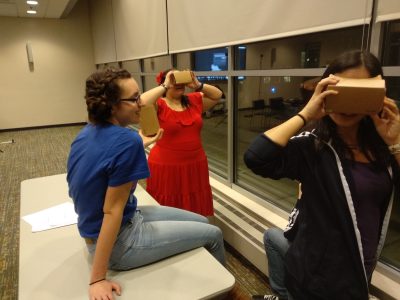 On Friday, February 22nd, OPIM Innovate co-hosted the Totally Teched Out Late Night Event in collaboration with UConn Late Night. In the Student Union, Room 104, a number of students from different academic backgrounds interacted with emerging technologies such as virtual reality headsets and leading software like Splunk Enterprise and HP Reveal. While many students walked in without prior knowledge of OPIM Innovate, they left with a piqued interest regarding what the initiative has to offer.
On Friday, February 22nd, OPIM Innovate co-hosted the Totally Teched Out Late Night Event in collaboration with UConn Late Night. In the Student Union, Room 104, a number of students from different academic backgrounds interacted with emerging technologies such as virtual reality headsets and leading software like Splunk Enterprise and HP Reveal. While many students walked in without prior knowledge of OPIM Innovate, they left with a piqued interest regarding what the initiative has to offer.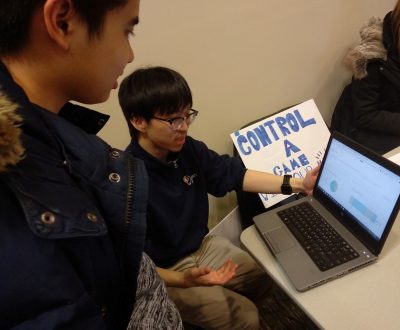 For some students, the Innovate Room at the Totally Teched Out Late Night Event was the first time they had ever encountered some emerging technologies or software. Xiaofeng Gong (’20 Mathematics and Economics), for example, had never heard of Splunk Enterprise before being introduced to the software by Nathan Hom. “A
For some students, the Innovate Room at the Totally Teched Out Late Night Event was the first time they had ever encountered some emerging technologies or software. Xiaofeng Gong (’20 Mathematics and Economics), for example, had never heard of Splunk Enterprise before being introduced to the software by Nathan Hom. “A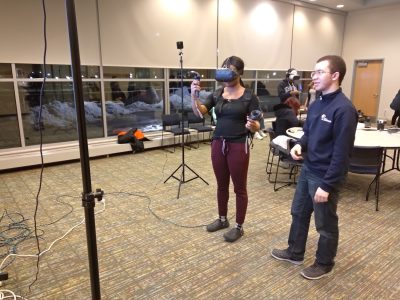 For the students running the Innovate Room, the hustle and bustle was worth every minute of getting to see interest emerge in another student’s face.
For the students running the Innovate Room, the hustle and bustle was worth every minute of getting to see interest emerge in another student’s face. 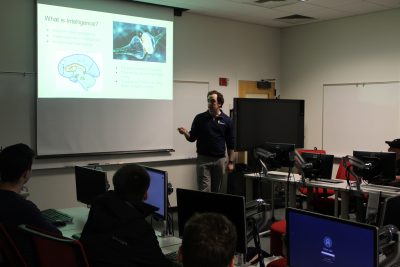 On Friday, February 15th, OPIM Innovate held its Introduction to Artificial Intelligence (A.I.) Workshop from 1:00 PM to 3:00 PM in the Gladstein Lab, BUSN 309. Led by
On Friday, February 15th, OPIM Innovate held its Introduction to Artificial Intelligence (A.I.) Workshop from 1:00 PM to 3:00 PM in the Gladstein Lab, BUSN 309. Led by  After a brief overview of the different areas and categories of artificial intelligence, students were paired up for an introductory activity. During this activity, one student from each group was told to keep their head down while the other student was shown a picture on the projector screen. Once the picture was covered back up, the students who had seen the image were told to explain to their partners how to draw it without context (for example, you could not say “cat” or “falling”). Instead, they could only explain things mathematically in angles, degrees, and shapes, mimicking the understanding of a computer. Both partners had an opportunity to draw and give directions, and many students were scratching their heads in the process. The photo on the left is of the drawings I and junior finance major
After a brief overview of the different areas and categories of artificial intelligence, students were paired up for an introductory activity. During this activity, one student from each group was told to keep their head down while the other student was shown a picture on the projector screen. Once the picture was covered back up, the students who had seen the image were told to explain to their partners how to draw it without context (for example, you could not say “cat” or “falling”). Instead, they could only explain things mathematically in angles, degrees, and shapes, mimicking the understanding of a computer. Both partners had an opportunity to draw and give directions, and many students were scratching their heads in the process. The photo on the left is of the drawings I and junior finance major 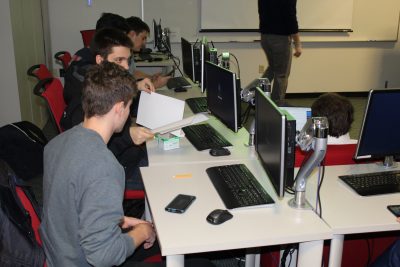 After the workshop, students were left baffled with how immense the world of artificial intelligence has become. One student, junior MIS major
After the workshop, students were left baffled with how immense the world of artificial intelligence has become. One student, junior MIS major 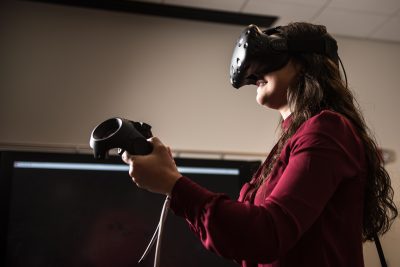 At the event, which was hosted in the Gladstein Research Lab, many emerging technologies were out for display and available to use. However, the biggest hit was the virtual reality (VR) demo, utilizing the HTC Vive’s virtual reality headset and wireless controllers. Strapped up to a portable backpack computer, students used the HTC Vive and Valve’s The Lab application to immerse themselves in several virtual reality environments. For Nicole Roehrig, a graduate exchange student from Germany studying mechanical engineering, the MIS Meet and Greet was the first place she had ever used a VR system. Reflecting on her experience after the demo, she said, “I heard a lot about [VR] in some of my lectures, but actually doing it was really cool.”
At the event, which was hosted in the Gladstein Research Lab, many emerging technologies were out for display and available to use. However, the biggest hit was the virtual reality (VR) demo, utilizing the HTC Vive’s virtual reality headset and wireless controllers. Strapped up to a portable backpack computer, students used the HTC Vive and Valve’s The Lab application to immerse themselves in several virtual reality environments. For Nicole Roehrig, a graduate exchange student from Germany studying mechanical engineering, the MIS Meet and Greet was the first place she had ever used a VR system. Reflecting on her experience after the demo, she said, “I heard a lot about [VR] in some of my lectures, but actually doing it was really cool.”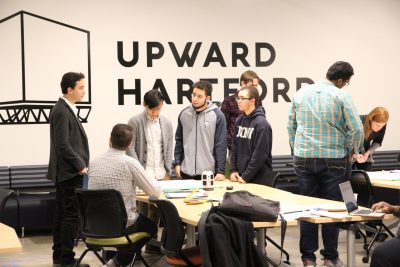 This year the University of Connecticut was invited to participate in Hackathon, an event hosted by Upward Hartford. Upward Hartford is a new innovation / co-working space located in downtown Hartford open to entrepreneurs looking for a place to create new ideas and other innovative projects. The Hackathon was open to everyone in the community and local colleges were encouraged to send members to participate. This year OPIM Innovate sponsored a team of freshman engineering students who are also pursing the analytics minor. These four exceptional students were eager to sign up and represent the university at the three day event.
This year the University of Connecticut was invited to participate in Hackathon, an event hosted by Upward Hartford. Upward Hartford is a new innovation / co-working space located in downtown Hartford open to entrepreneurs looking for a place to create new ideas and other innovative projects. The Hackathon was open to everyone in the community and local colleges were encouraged to send members to participate. This year OPIM Innovate sponsored a team of freshman engineering students who are also pursing the analytics minor. These four exceptional students were eager to sign up and represent the university at the three day event.